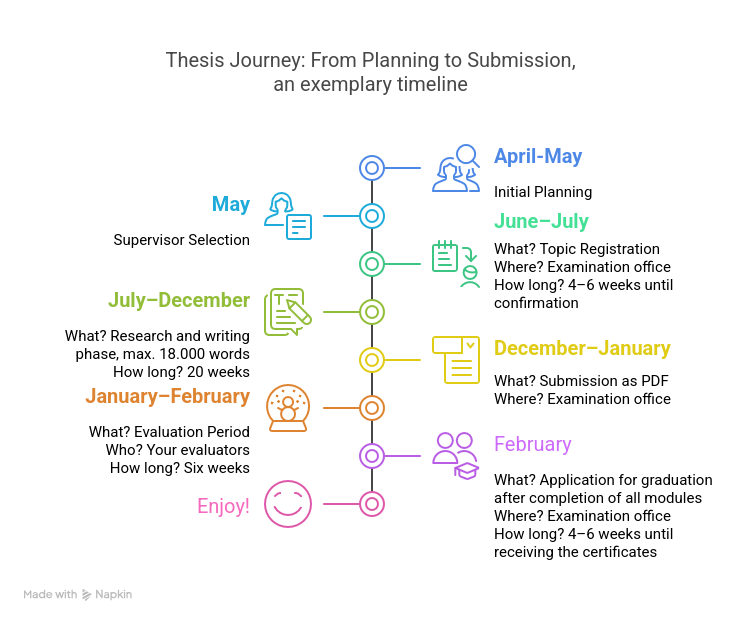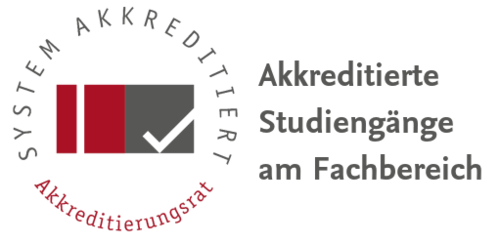Your Thesis: An Interdisciplinary Journey
Writing your master's thesis is where everything comes together—your language skills, your methodological training, your curiosity about the Middle East. At ISME, theses are often genuinely interdisciplinary, crossing boundaries between periods, regions, languages, or disciplines. This can be exciting and challenging, both for you and for your supervisors who may be more accustomed to strictly disciplinary projects.
Think of your thesis as a 15,000-18,000 word conversation with scholars, sources, and ideas. You have 20 weeks to write it, but the thinking starts much earlier.
Finding Your Thinking Partners
You'll work with two supervisors who will also independently grade your thesis—but think of them as your thinking partners, not just people who approve your topic or who guide you as mentors to getting the best grade.
At Freie Universität, you are expected to write your thesis mostely independently.
What matters most? Who do you want to be in conversation with for the next several months? Whose questions push your thinking? Whose feedback style works for you?
At least one supervisor must be a full professor (!) teaching in ISME or associated with ISME and the Department of History and Cultural Studies. The other can be a non-professor ISME instructor (with approval) or someone from another department or institution. It is crucial to understand that in the end you will be awarded a degree from the Department of History and Cultural Studies which is why it is necessary to have a full professort from the department or at least from Freie Universität Berlin on the supervisor team.
Who teaches what at ISME?
Rather than matching topics mechanically, think about intellectual approaches:
If you're working with texts and manuscripts, also in digital form:
Beatrice Gruendler, Grace Park, Isabel Toral, Ingrid Evans, Eliese-Sophia Lincke, Christian Casey, Hubert Mara
If you're interested in modern cultural production:
Victoria Mummelthei, Montserrat Rabadan, Khanna Usoyan
If you're exploring intellectual history and thought:
Lukas Mühlethaler, Florian Zemmin, Christian Mauder, Reimund Leicht, Cale Johnson
If you're working on contemporary social or political questions:
Schirin Amir-Moazami, Florian Zemmin, Theocharis Grigoriadis
If you're doing historical work:
Shoghig Hartmann, Ulrike Freitag, Isabel Toral, Johannes Panagiotidis-Niehoff, Christian Mauder, Florian Zemmin
If you're working with languages and linguistics:
Shabo Talay, Grace Park, Alberto Cantera Glera, Beatrice Gründler
If you're interested in art, material culture, or urban space:
Stefan Weber, Isabel Toral, Victoria Mummelthei
Please note that every potential supervisor has specific regional and linguistic expertise, so if you need someone who can read e.g. Ottoman sources or Judaeo-Arabic, keep that in mind.
This list isn't exhaustive—most professors supervise beyond their core specializations. Check their personal websites to learn about their current research and see if there's intellectual resonance.
Looking beyond ISME
ISME theses often benefit from interdisciplinary supervision. You might find methodological or thematic expertise in:
- Political Science, Anthropology, or History departments
- Berlin Graduate School Muslim Cultures and Societies (BGSMCS)
- Collaborative Research Centers (Temporal Communities, Liberal Scripts)
- Other Berlin universities (HU, TU)
As of 2025, also persons who are experts and professional in their fields but not currently in a teaching position at a university can be appointed as supervisors and examiners. Check with the examination office for details.
Note: External supervisors aren't obligated to work with ISME students, so read their work carefully and reach out thoughtfully. In rare cases, you can even work with a professor from another German or international university—talk to us about this.
The Journey: From Idea to Submission

1. Start thinking early (semester 3)
What courses excited you? Which papers could expand into something bigger? Don't wait until you have a perfect topic—start with curiosity.
Tell your academic advisors you're planning to write in semester 4. We can help you think through who might be good thinking partners.
2. Join "Communicating Research" (semester 4)
This module runs alongside your thesis writing and gives you peer feedback on your evolving ideas. It's designed to complement your writing process.
3. Find your supervisors
Schedule exploratory conversations with potential supervisors. Bring:
- Your initial ideas (even if rough)
- A sense of what you've read
- Questions about their approach
For interdisciplinary projects: Meet with both supervisors together early on. Make sure everyone understands what "good work" looks like across different disciplinary standards. What does one supervisor value that the other might not? How will they evaluate your thesis?
4. Register your topic
Once you and your supervisors agree on a direction, fill out this form, get both signatures, and send it to the examination office.
Important: You need at least 45 ECTS from your core area and 15 ECTS from another module to register.
The examination committee processes this (4-6 weeks) and sends you an official letter with your topic, deadline, and submission requirements.
If you're finishing: If the thesis is your last exam and you've completed all modules, you don't need to stay enrolled to write. Only enroll if you want to take courses.
5. Write (20 weeks)
Length: 15,000-18,000 words
Language: English
Structure: Plan for a midterm meeting—send your supervisors an outline and 1-2 chapters beforehand
Stay in regular contact with your supervisors. Ask for feedback. Talk to peers in Communicating Research. This is a conversation, not isolation.
If something goes wrong: Life happens. If you can't work on your thesis for more than 3 months due to serious circumstances, the examination committee will decide next steps. This might mean starting over, but previous attempts won't count against you.
6. Submit
When you're done, submit:
- 3 bound copies to the examination office
- 1 electronic copy (PDF)
- A signed statement confirming this is your own work and listing all sources
7. Evaluation (6 weeks)
Your two supervisors (usually) will be your two examiners. They have 6 weeks to write evaluations and determine your grade.
Passing grade: 4.0 or higher.
8. Stay connected
Once you get your grade, let us know! Check out information about graduating and joining our alumni network.
The Official Requirements (translated into human-readbale form)
Here's what the examination regulations actually mean:
What's the thesis for?
To show you can do advanced, independent interdisciplinary research on the Middle East and present it professionally in writing.
Who can register?
You need 45 ECTS from core modules + 15 ECTS from another module, and you need to be enrolled at FU (unless this is your last exam).
How do I register?
Submit the form with confirmation from a supervisor. If you don't have a supervisor yet, the committee will assign one (but finding your own is much better!).
What's the timeline?
Committee assigns topic → 20 weeks to write → Submit → 6-8 weeks for evaluation
Can I decline a topic?
Yes, once, within 2 weeks of assignment. Then it's like it never happened.
What if I need more time?
If serious circumstances prevent you from working for 3+ months, talk to the examination committee.
Depending on what you agreed upon, bring this up early—to them first, then to us if it doesn't improve. If you've tried scheduling meetings and it's not working, we can help mediate or find solutions.
It is important to be upfront with potential supervisors as to how much supervision you want and how much your supervisors can give. It often happens that supervisprs will just approve the topic and then expect you to write the paper on your own, so be clear about your needs during communication with your supervisors.
First: this rarely happens. But if you're getting "not my expertise" responses, you might need to adjust either your topic or your search. Talk to us (isme@geschkult.fu-berlin.de)—we can help you find the right match or refine your approach. Sometimes it's about how you frame the project.

